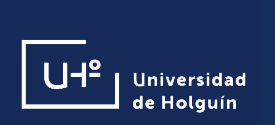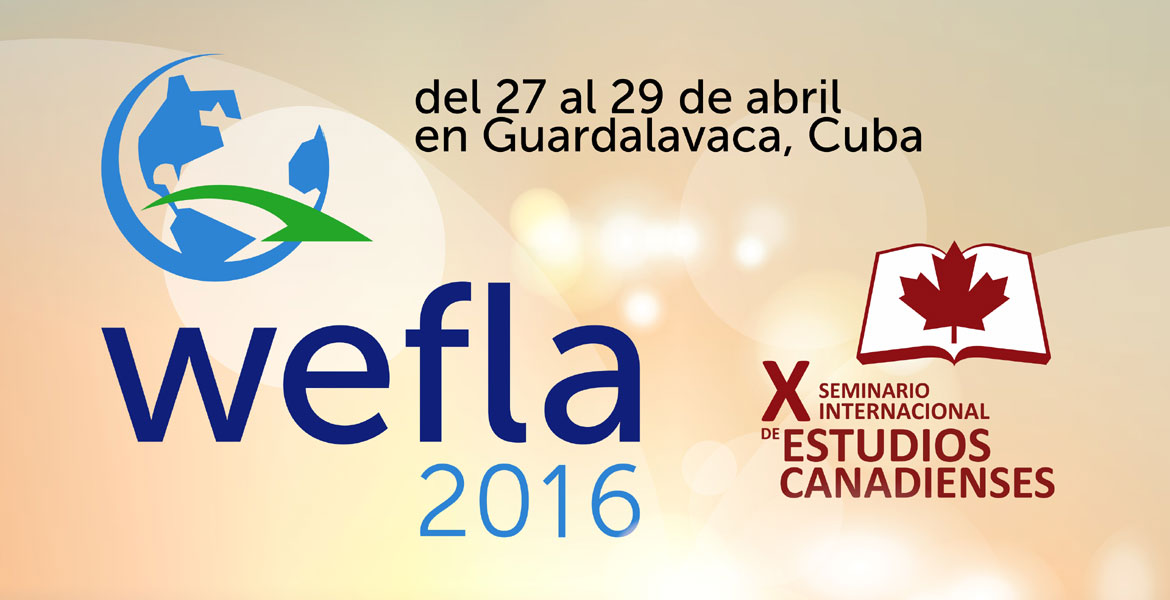

Cada dos años, abril se convierte en el periodo ideal para que amigos, investigadores e intelectuales apasionados de las lenguas extranjeras, la comunicación y cultura, se reúnan en el Hotel Club Amigo Atlántico-Guardalavaca para intercambiar, dialogar y analizar interesantes temáticas en el marco del evento -en esta ocasión WEFLA 2016-, que serán ampliadas en el décimo Seminario Internacional sobre Estudios Canadienses: Canadá: manejo de la diversidad social y cultural.
Para este encuentro, la Facultad de Humanidades de la Universidad de Holguín, en colaboración con el Departamento de Estudios Franceses de la Facultad de Artes y Humanidades de The University of Western, Canadá y el Departamento de Lenguas de la University of Toronto-Mississauga, Canadá proponen 12 cursos pre evento, a desarrollarse el próximo martes 26 de abril de 2016.
Martes/Tuesday 26
9:00 a.m -1:00 pm: Cursos y Talleres pre-conferencia / Pre-conference courses and workshops
Lugar: Universidad de Holguín. Campus Celia Sánchez Manduley
Curso 1: CUBA Y LA DIALÉCTICA DE LA ACTUALIZACIÓN DE SU MODELO
(cuenta con servicio de traducción) Marla Vega
Coordinador: Marla Vega
Docente 1. 2da. Planta. Aula 4 (Aula de Marxismo)
Herramientas teóricas y metodológicas para el análisis del proceso de actualización del modelo económico cubano. Categorías principales: ética, gobernabilidad, legitimidad, gobernanza, democracia. El contexto de la actualización del modelo económico cubano. Las Relaciones Cuba – Estados Unidos y Cuba – Unión Europea. La concepción de la actualización del modelo económico cubano. La dialéctica de las clases sociales en la actualización del modelo económico cubano. El sector privado, cooperativo y mixto. Vida política y cultural de la nación cubana.
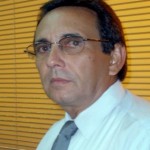 Profesor: Dr.C. Luis Orlando Aguilera García, Profesor Titular. Universidad de Holguín. Cuba. Doctor en Ciencias Filosóficas. Trabaja en líneas de investigación relacionadas con: Indicadores de desempeño e impacto en el desarrollo local de la labor de las IES. Epistemología de las ciencias. Teoría de la legitimidad y gobernabilidad de los procesos políticos y sociales. Gestión universitaria del conocimiento y la innovación. Epistemología de la educación superior. Tendencias actuales del desarrollo de las universidades, su impacto en las relaciones Universidad Municipalidad. La gestión universitaria del conocimiento y la innovación. Universidad, Ciencia y Tecnología.
Profesor: Dr.C. Luis Orlando Aguilera García, Profesor Titular. Universidad de Holguín. Cuba. Doctor en Ciencias Filosóficas. Trabaja en líneas de investigación relacionadas con: Indicadores de desempeño e impacto en el desarrollo local de la labor de las IES. Epistemología de las ciencias. Teoría de la legitimidad y gobernabilidad de los procesos políticos y sociales. Gestión universitaria del conocimiento y la innovación. Epistemología de la educación superior. Tendencias actuales del desarrollo de las universidades, su impacto en las relaciones Universidad Municipalidad. La gestión universitaria del conocimiento y la innovación. Universidad, Ciencia y Tecnología.
Curso 2: SOCIEDAD Y CULTURA CUBANA
(con traducción al inglés) Anabel González González
Coordinador: Bárbara Leyva Contreras
Docente 1. Planta baja. Aula 1 (Aula especializada de Historia)
A partir del análisis de los elementos conformadores de nuestra nacionalidad desde un enfoque historiográfico, se demuestran el carácter y la esencia del cubano, las transformaciones económicas, políticas y sociales ocurridas a través del tiempo y como estos han contribuido a la diversidad de expresiones en la creación artística y cultural.
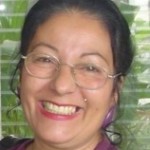 Dra. Carolina Gutiérrez. Profesora Titular de la Universidad de Holguín, Cuba y Dra. en Ciencias Pedagógicas. Especialista en Lengua y Literatura, temas martianos y problemas actuales de la cultura. Más de 40 años de experiencia en la Enseñanza Media y la Enseñanza Superior. Ha impartido cursos de español para extranjeros en Bluffton College y curso de Apreciación del texto hispano en Northwestern College, ambos centros en el estado de Ohio, EE.UU. Ha publicado numerosos artículos vinculados con su especialidad en revistas nacionales y extranjeras. Autora de dos libros de investigación histórica y un ensayo de tema martiano. Ha participado en numerosos eventos nacionales e internacionales.
Dra. Carolina Gutiérrez. Profesora Titular de la Universidad de Holguín, Cuba y Dra. en Ciencias Pedagógicas. Especialista en Lengua y Literatura, temas martianos y problemas actuales de la cultura. Más de 40 años de experiencia en la Enseñanza Media y la Enseñanza Superior. Ha impartido cursos de español para extranjeros en Bluffton College y curso de Apreciación del texto hispano en Northwestern College, ambos centros en el estado de Ohio, EE.UU. Ha publicado numerosos artículos vinculados con su especialidad en revistas nacionales y extranjeras. Autora de dos libros de investigación histórica y un ensayo de tema martiano. Ha participado en numerosos eventos nacionales e internacionales.
Curso 3: READING TRADITIONAL FIGURES AND FORMS IN INDIGENOUS WRITING
Coordinador: Maela Margarita Mariño Pérez
Docente 1. Planta baja. Aula 1 Puerta 3
This workshop will introduce concerns about reading traditional forms and figures in indigenous writing in Canada. In particular, we will look at how much of what we read as native writing is hybrid in nature, expressing traditional beliefs or figures through non-native literary forms. We will consider the transcribed orature of Orpingalik, the Netsilik Inuit orator, who composed “My Breath.” Oral performance, the mediation of transcription and translation, and the need to understand different notions of song and spirit will be discussed in a reading of his famous song. We will also consider the emergence of traditional figures and forms in contemporary indigenous writing by Highway, Robinson, and Boyden. We will look at specific examples of the trickster figure and the non-native conception of this figure compared to its multiple traditional forms, such as the Windigo and the B’Gwas.
 Roxanne Rimstead is Professor of Comparative Canadian Literature at Université de Sherbrooke, in Québec, Canada, where she specializes in class and cultural studies, minority writing, feminist criticism, indigenous literature, life writing, and cultural memory. Her book The Remnants of Nation: On Poverty Narratives by Women (U of Toronto Press) won the Gabrielle Roy Prize in 2001. An early feminist analysis of Emily Carr’s Klee Wyck won the Don D. Walker Prize (Western Lit. Assoc.). In 2003, she guest-edited Cultural Memory and Social Identity (Essays on Canadian Writing); in 2011, she co-edited Prison Writing/Writing Prison (Canadian Literature); and in 2009, she created, with grad students, a book-length website on Culture from Below http://culture-from-below.recherche.usherbrooke.ca/. Rimstead is on the editorial boards of Canadian Literature, Tulsa Studies in Women’s Literature (USA), and Race, Gender and Class (USA). Two critical collections on contested space are forthcoming and co-edited with colleagues Domenico Beneventi and Simon Harel.
Roxanne Rimstead is Professor of Comparative Canadian Literature at Université de Sherbrooke, in Québec, Canada, where she specializes in class and cultural studies, minority writing, feminist criticism, indigenous literature, life writing, and cultural memory. Her book The Remnants of Nation: On Poverty Narratives by Women (U of Toronto Press) won the Gabrielle Roy Prize in 2001. An early feminist analysis of Emily Carr’s Klee Wyck won the Don D. Walker Prize (Western Lit. Assoc.). In 2003, she guest-edited Cultural Memory and Social Identity (Essays on Canadian Writing); in 2011, she co-edited Prison Writing/Writing Prison (Canadian Literature); and in 2009, she created, with grad students, a book-length website on Culture from Below http://culture-from-below.recherche.usherbrooke.ca/. Rimstead is on the editorial boards of Canadian Literature, Tulsa Studies in Women’s Literature (USA), and Race, Gender and Class (USA). Two critical collections on contested space are forthcoming and co-edited with colleagues Domenico Beneventi and Simon Harel.
Curso 4: MANAGING DIVERSITY, OR NEGOTIATING IT?: RECENT « VALUES DEBATES » IN CANADA
Coordinador: Pedro A. Friman Martínez
Docente 1. Planta baja. Aula 2 Puerta 4
If Canadian multiculturalism and Québec interculturalism were conceived as distinct but related strategies for managing the ethnic and racial diversity of their respective polities, two recent debates have amply demonstrated the limitations and vulnerabilities of these approaches. The 2014 Charter of Values debate in Quebec and the attempt to make the niqab and so-called “barbaric cultural practices” defining issues in the 2015 federal election campaign re-framed the challenges of managing pluralist societies as ones of identifying and controlling “unruly” elements who lie outside normative patterns for inclusion within a given state formation. By way of contrast, the current campaign to welcome Syrian refugees initiated by the new federal government and supported strongly by the new government of Quebec proposes an entirely different mise-en-scène: no longer called upon to denounce offenders, whether they be wearing “conspicuous” religious symbols or allegedly engaging in uniquely offensive practices, citizens are now urged to partake in a process that appeals to Canadian humanitarianism and openness, themselves posited as national values. To what extent can this mise-en-scène be regarded as a kind of mass civics lesson aimed at replacing a solipsistic normativity with a dialogical model that sees diversity within pluralist societies as a matter not of management, but of negotiation; a negotiation that necessarily transforms the pluralist state itself?
 Robert Schwartzwald, Université de Montréal, CANADA. He is a professor in the Département de littératures et de langues du monde and Director of the interdisciplinary Master’s program in International Studies at the Université de Montréal. Before coming to Montréal, he directed the Center for Crossroads in the Study of the Americas in Amherst, Massachusetts. He has written extensively on Quebec literature and film, with a particular focus on representations of sexuality in narratives of national and cultural modernity. He is a member of the Centre de Recherche interuniversitaire en littérature et culture québécoises (CRILCQ) and the Centre de Recherches interdisciplinaires en études montréalaises (CRIEM). A former Editor of the International Journal of Canadian Studies/ Revue internationale d’études canadiennes, he received the Governor General’s International Award for Canadian Studies in 2008. His t book on Jean-Marc Vallée’s highly acclaimed film C.R.A.Z.Y. (Arsenal Pulp Press) was released at the end of 2015.
Robert Schwartzwald, Université de Montréal, CANADA. He is a professor in the Département de littératures et de langues du monde and Director of the interdisciplinary Master’s program in International Studies at the Université de Montréal. Before coming to Montréal, he directed the Center for Crossroads in the Study of the Americas in Amherst, Massachusetts. He has written extensively on Quebec literature and film, with a particular focus on representations of sexuality in narratives of national and cultural modernity. He is a member of the Centre de Recherche interuniversitaire en littérature et culture québécoises (CRILCQ) and the Centre de Recherches interdisciplinaires en études montréalaises (CRIEM). A former Editor of the International Journal of Canadian Studies/ Revue internationale d’études canadiennes, he received the Governor General’s International Award for Canadian Studies in 2008. His t book on Jean-Marc Vallée’s highly acclaimed film C.R.A.Z.Y. (Arsenal Pulp Press) was released at the end of 2015.
Curso 5: CULTURAL RECONCILIATION: WHAT IT MEANS AND HOW TO ACHIEVE IT.
Coordinador: Lilian Patricia Rodríguez Sintes
Docente 3. Planta baja. Aula 3 Puerta 5
In this workshop the presenters will explore ways in which literary and theatrical culture in Canada can promote a genuine state of reconciliation, and will survey the state of Canadian cultural industries. We will look at some of the major literary and dramatic voices, and ask how we, as non-Indigenous scholars in positions of academic privilege, can establish productive alliances with Indigenous scholars and artists.
 Dr. Linda Warley is Associate Professor in the Department of English Language & Literature at the University of Waterloo, Canada. She teaches contemporary Canadian literature and has recently developed a new undergraduate course on Indigenous literatures. Her research is in the field of Life Writing, and she has published articles on Indigenous memoirs, graphic memoirs, and multimodal life narratives.
Dr. Linda Warley is Associate Professor in the Department of English Language & Literature at the University of Waterloo, Canada. She teaches contemporary Canadian literature and has recently developed a new undergraduate course on Indigenous literatures. Her research is in the field of Life Writing, and she has published articles on Indigenous memoirs, graphic memoirs, and multimodal life narratives.
Alan Filewod is Professor of Theatre Studies and Director of the School of English and Theatre Studies at the University of Guelph.
 His books include Committing Theatre: Theatre Radicalism and Political Intervention in Canada (2011), Performing Canada: The Nation Enacted in the Imagined Theatre (2002), Collective Encounters: Documentary Theatre in English Canada (1987), and (with David Watt) Workers’ Playtime: Theatre and the Labour Movement since 1970 (2001.) His critical edition of the banned communist play Eight Men Speak is available from University of Ottawa Press. He was Editor of Canadian Theatre Review from 1988 to 1995, and Co-Editor from 1995 to 2002.
His books include Committing Theatre: Theatre Radicalism and Political Intervention in Canada (2011), Performing Canada: The Nation Enacted in the Imagined Theatre (2002), Collective Encounters: Documentary Theatre in English Canada (1987), and (with David Watt) Workers’ Playtime: Theatre and the Labour Movement since 1970 (2001.) His critical edition of the banned communist play Eight Men Speak is available from University of Ottawa Press. He was Editor of Canadian Theatre Review from 1988 to 1995, and Co-Editor from 1995 to 2002.
In professional activities he has served as president of the Association for Canadian Theatre Research (1992-4) and of the Association for Canadian and Quebec Literatures/ Association des littératures canadienne et québécoise (2004-7).
Curso 6: WRITING REVIEWS AND INFLUENCING READERS: THE BASICS OF WRITING SUCCESSFUL BOOK REVIEWS
Coordinador: Ramón Betancourt Campaña
Docente 1. Planta baja. Aula 4 Puerta 6
In this pre-conference workshop students will learn and practice the basics of writing a brief review of a book of their choice. Participants are asked to bring a novel, an anthology or a collection of poetry or stories that they are familiar with, preferably by one or more Cuban authors. Students will also be introduced to basic components of editing reviews and to key steps in compiling them into a book review magazine.
 Michelle Ariss is an English teacher at Champlain College Lennoxville, in Sherbrooke, Québec where she is also co-coordinator of the English Department and coordinator of the College’s English peer-tutoring service. She is a graduate of the Comparative Canadian Literature Ph.D. program at the Université de Sherbrooke under the supervision of Dr. Roxanne Rimstead. Michelle’s SSHRC, FQRSC and institutionally-funded dissertation is entitled “The Rise and Demise of a Book Review Magazine: Interpreting the cultural work of Books in Canada, 1971-2008.” A contributing editor to Books in Canada from 2004 to 2007, Michelle was a member of the organizing committee of two graduate student conferences hosted by the Université de Sherbrooke’s Comparative Canadian Literature program. In addition to co-editing the proceedings of those conferences with Simon Gilbert and with the collaboration of Dr. Rimstead, Michelle was a research assistant for the Culture-from-Below online bibliography directed by Dr. Rimstead. While teaching at Bishop’s University in 2004, Michelle founded the Morris House Reading Series. This invitational series, intended to introduce students and the public to some of Canada’s best-known authors, celebrated its 10th anniversary in March, 2014.
Michelle Ariss is an English teacher at Champlain College Lennoxville, in Sherbrooke, Québec where she is also co-coordinator of the English Department and coordinator of the College’s English peer-tutoring service. She is a graduate of the Comparative Canadian Literature Ph.D. program at the Université de Sherbrooke under the supervision of Dr. Roxanne Rimstead. Michelle’s SSHRC, FQRSC and institutionally-funded dissertation is entitled “The Rise and Demise of a Book Review Magazine: Interpreting the cultural work of Books in Canada, 1971-2008.” A contributing editor to Books in Canada from 2004 to 2007, Michelle was a member of the organizing committee of two graduate student conferences hosted by the Université de Sherbrooke’s Comparative Canadian Literature program. In addition to co-editing the proceedings of those conferences with Simon Gilbert and with the collaboration of Dr. Rimstead, Michelle was a research assistant for the Culture-from-Below online bibliography directed by Dr. Rimstead. While teaching at Bishop’s University in 2004, Michelle founded the Morris House Reading Series. This invitational series, intended to introduce students and the public to some of Canada’s best-known authors, celebrated its 10th anniversary in March, 2014.
Curso 7: DISCOVERING AFRICAN-CARIBBEAN-CANADIAN WRITERS
Coordinador: Leticia Robles Holt
Docente 4. 2da. Planta. Aula 1
This teaching workshop shows that African-Caribbean-Canadian literature is an aspect of Western historical memory helping maintain a “dominated–dominating” paradigm within and between nations. It discusses Max Dorsinville’s ironic representation of the Québécoise bourgeoisie and Dionne Brand’s depiction of marginal reception of Black culture in Toronto to highlight neo-colonial elements of Canada’s pre-sent reality. This workshop will be illuminated by the work of Maurice Halbwachs, Albert Memmi, C.L.R. James, and Francoise Lionnet. Evoking the cultural identity theories of Aime Césaire, Édouard Glissant, Derek Walcott, Chris Bongie, Dionne Brand, Max Dorsinville, and Dany Laferrière, this thesis recalls through Canadian literature a Caribbean literary tradition rooted in the reconstruction of memory. Ms. Wright will introduce works such as Dionne Brand’s At the Full and Change of the Moon, Austin Clarke’s The Polished Hoe, Max Dorsinville’s James Wait et les lunettes noires, and Dany Laferrière’s Pays sans chapeau.
 Nancy Wright is currently a PhD candidate at Université de Sherbrooke in Comparative Canadian Literature. She wrote her MA thesis at Sherbrooke on African-Caribbean-Canadian writers and the representation of cultural memory in their work. She is currently Editor of the (national publication) Justice Report and Editorial Secretary of the (peer-reviewed) Canadian Journal of Criminology and Criminal Justice for the Canadian Criminal Justice Association / Association canadienne de justice pénale (CCJA-ACJP (Nov. 2011-Present).
Nancy Wright is currently a PhD candidate at Université de Sherbrooke in Comparative Canadian Literature. She wrote her MA thesis at Sherbrooke on African-Caribbean-Canadian writers and the representation of cultural memory in their work. She is currently Editor of the (national publication) Justice Report and Editorial Secretary of the (peer-reviewed) Canadian Journal of Criminology and Criminal Justice for the Canadian Criminal Justice Association / Association canadienne de justice pénale (CCJA-ACJP (Nov. 2011-Present).
Curso 8: LITERARY TRANSLATION IN QUÉBEC/CANADA
Coordinador: Fernando Javier Bracho
Docente 4. 2da. Planta. Aula 4
This workshop will look at three aspects of English-French literary translation in Québec-Canada: economic issues (how much and how literary translators are paid and by whom), political tensions (relative status of English and French in Canada, linguistic variations and power imbalance between Quebec and France) and aesthetic issues (visions of translation, how to render voice, tone, cultural context), etc. Ethical issues around translation and self-translation as well as various metaphors of literary translation will be considered.
 Lori Saint-Martin is a professor of literature, Université du Québec à Montréal, specializing in feminist theory and Quebec literature. She has published three collections of short stories and a novel as well as a dozen essays on contemporary Quebec literature. With Paul Gagné, she has translated 90 works of fiction and non-fiction from English to French and has won the Governor General’s Award for literary translation three times (2000, 2007 and 2015). She also translates from Spanish to French (Gustavo Nielsen, Le coeur de Doli, Strasbourg, La dernière goutte, 2015).
Lori Saint-Martin is a professor of literature, Université du Québec à Montréal, specializing in feminist theory and Quebec literature. She has published three collections of short stories and a novel as well as a dozen essays on contemporary Quebec literature. With Paul Gagné, she has translated 90 works of fiction and non-fiction from English to French and has won the Governor General’s Award for literary translation three times (2000, 2007 and 2015). She also translates from Spanish to French (Gustavo Nielsen, Le coeur de Doli, Strasbourg, La dernière goutte, 2015).
Curso 9: EVALUATING PROFICIENCY IN SPANISH LANGUAGE COURSES AT WESTERN UNIVERSITY
Coordinador: Yusimí Borjas Algecira
Docente 4. 2da. Planta. Aula 2
This workshop will be focus on the evaluation techniques implemented for Spanish Language courses at Western University. It will review how to evaluate test, compositions, oral presentations and oral exams, providing rubrics for each of them. Participants will be given samples of evaluation and will practice with real assessments.
 Ana García is the Spanish Language and Community Service Learning Coordinator at Western University. She has been working tat Western since 1999. Her main role is to coordinate Spanish Language courses at all levels. This ties in with her research interests in Spanish Language Teaching and Learning. She holds a Masters in Teaching Spanish as a Second Language and a Masters in eLearning – Information and Knowledge Society.
Ana García is the Spanish Language and Community Service Learning Coordinator at Western University. She has been working tat Western since 1999. Her main role is to coordinate Spanish Language courses at all levels. This ties in with her research interests in Spanish Language Teaching and Learning. She holds a Masters in Teaching Spanish as a Second Language and a Masters in eLearning – Information and Knowledge Society.
Curso 10: QUEBEC STRATEGIES THAT MEET THE PARTICULAR NEEDS OF STUDENTS WITH SPECIAL NEEDS IN QUEBEC
Coordinadora: Rita Cepero (English / French) with Translation: Catherin Lopez
Docente 4. 2da. Planta. Aula 3.
Defining concepts of student special needs or at risk
- At-risk students, students with learning difficulties
- Students with behavioral disorders
The updating of the individualized approach requires, on the part of all school stakeholders, managers or other stakeholders, adjustments in respect of their practices.
In line with the teaching practices implemented for all students, namely differentiation, support, regulation and collegiality, the school director, in collaboration with teachers and other stakeholders, including staff complementary educational services, has a responsibility to meet the educational needs of each student entrusted to him.
Meeting the needs of each student must be based on an assessment that allows to know not only the difficulties but also the achievements and capabilities of each.
It is for the school team to identify these needs and provide the necessary measures to respond, since she knows best these students and the forces of the environment in which they operate.
 Lynda T Simard Manager and Education Expert, Director of three (3) primary and project manager (school / company) to the Commission scolaire du Lac St Jean, Quebec, Canada. Expertise abroad (12 missions) including several in Africa on different subjects (student retention, student integrated, results-based management, repetition)
Lynda T Simard Manager and Education Expert, Director of three (3) primary and project manager (school / company) to the Commission scolaire du Lac St Jean, Quebec, Canada. Expertise abroad (12 missions) including several in Africa on different subjects (student retention, student integrated, results-based management, repetition)
Curso 11: BASIC PRINCIPLES OF INTEREST- BASED NEGOTIATIONS
Coordinador: Manuel Leyva Traductora: Elizabeth Hierrezuelo
Docente 4. Planta baja. Salón de Derecho.
Many communities and organizations are either engaged or preparing to engage in some form of negotiations on a variety of internal or external issues. Preparing oneself or their organization is critical to ensure successful outcomes. Principled and interest based negation rely heavily on core concepts such as relationship, communication, interests, options, legitimacy, alternatives and commitments. Understanding and applying these concepts effectively ensures participants the greatest chance of positive outcomes in any engagement. This four-hour workshop will focus on the basic principles of interest-based negotiations by exploring these basic elements of interest and principle based negotiation.
 Troy Chaifoux. Banff Indigenous Centre. Alberta. Canada. Bachelor of Law Degree, University of Alberta, Faculty of Law 1991-Bachelor of Arts University of Alberta (General). Canadian History, Political Science. The Banff Centre, Indigenous Leadership and Management, Negotiations Skills Training, Faculty Leader. Design, research and deliver course in First Nation Interest Based Negotiations. Alberta School of Business, Executive Education. University of Alberta, Faculty of Law, Sessional Instructor.
Troy Chaifoux. Banff Indigenous Centre. Alberta. Canada. Bachelor of Law Degree, University of Alberta, Faculty of Law 1991-Bachelor of Arts University of Alberta (General). Canadian History, Political Science. The Banff Centre, Indigenous Leadership and Management, Negotiations Skills Training, Faculty Leader. Design, research and deliver course in First Nation Interest Based Negotiations. Alberta School of Business, Executive Education. University of Alberta, Faculty of Law, Sessional Instructor.
Curso 12: LANGUAGE AND CORPORATE IDENTITY: THE CONTENT ANALYSIS OF CODES OF CONDUCT
Coordinador: David Almaguer de la Rosa
Aula especializada de Lengua Inglesa. Sede Celia Sánchez
One of the challenges in the study of Corporate Social Responsibility (CSR) stems from the dominance of a standardization and objectification. 70% of Global 500 firms are said to oblige to report their social performance through standardized social audits. However, notions of ethical values vary with time, place and circumstance. A different emphasis on corporate values by country of origin and industry should be expected. This study compares the different emphasis on the expressions of ethical characters of global companies by country and industry of origin. A content analysis of the ethical statements of 122 Fortune Global 500 firms drawn from 4 industry sectors: Petroleum refining (29 firms), Commercial banks (56 firms), Pharmaceuticals (13 firms), and Food and drug stores (24 firms) is presented, using correspondence analysis map. The framework for coding themes used the Virtue Ethical Character Scale.
Results indicated that American firms tended to emphasize courage, rather than integrity; European firms generally emphasized integrity, followed by empathy, with Asian firms being closer to the Europeans. Retailers and pharmaceuticals emphasized empathy while banks and petroleum emphasized courage. Implications for multinational companies are discussed. For example, in 2014, the Cuban government passed a new foreign investment law that offered tax cuts (profit tax to 15% and 25% of labor tax). aiming to attract $2 billion in foreign direct investments to achieve an economic growth target of 7%. Future research may be benefited from exploring the dimensions of virtue character that are most appreciated in such a transitional economy. (250 words)
 Rosa Chun is Chair in Global Leadership, Reputation and Responsibility at UCD Smurfit Graduate Business School in Ireland. Prior to joining UCD, Professor Chun was Professor of Corporate Reputation at IMD, Switzerland, and held a Chair in Business Ethics and Corporate Social Responsibility at Manchester Business School, U.K. She has taught globally at CEIBS, Rotterdam School of Management, Bocconi, Lugano, Fudan, and Yonsei University where she held a visiting professorship.
Rosa Chun is Chair in Global Leadership, Reputation and Responsibility at UCD Smurfit Graduate Business School in Ireland. Prior to joining UCD, Professor Chun was Professor of Corporate Reputation at IMD, Switzerland, and held a Chair in Business Ethics and Corporate Social Responsibility at Manchester Business School, U.K. She has taught globally at CEIBS, Rotterdam School of Management, Bocconi, Lugano, Fudan, and Yonsei University where she held a visiting professorship.
Professor Chun’s research has focused on developing corporate reputation as a strategic framework for senior management. Alongside her development of the executive and masters programs for corporate communications and reputation management, her research demonstrates how firms’ performance is linked to the reputation gaps, and virtue ethics. These findings are based on extensive empirical work with services (Tesco, House of Fraser), IT businesses (Samsung, Sony), and the governmental and non-profit organizations (Police, Health center, Catholic churches). Her work appears in the Strategic Management Journal, Harvard Business Review, Journal of Academy of Marketing Science, Journal of Business Ethics, and Industrial Marketing Management among others, and was featured in the Financial Times, the New York Times, the Economist, Marketing Week, Times of India, Chosun Daily, Donga Daily, and Maeil Business Newspaper. Prof Chun is currently working on her forthcoming book ‘Repute and Disrepute’ (by John Wiley). Most recently Prof Chun is working on a global project comparing happiness in Cuba, South Korea, Switzerland.
Este intercambio académico precederá las sesiones de WEFLA 2016, previstas desde el 27 al 29 de abril en su décima edición.
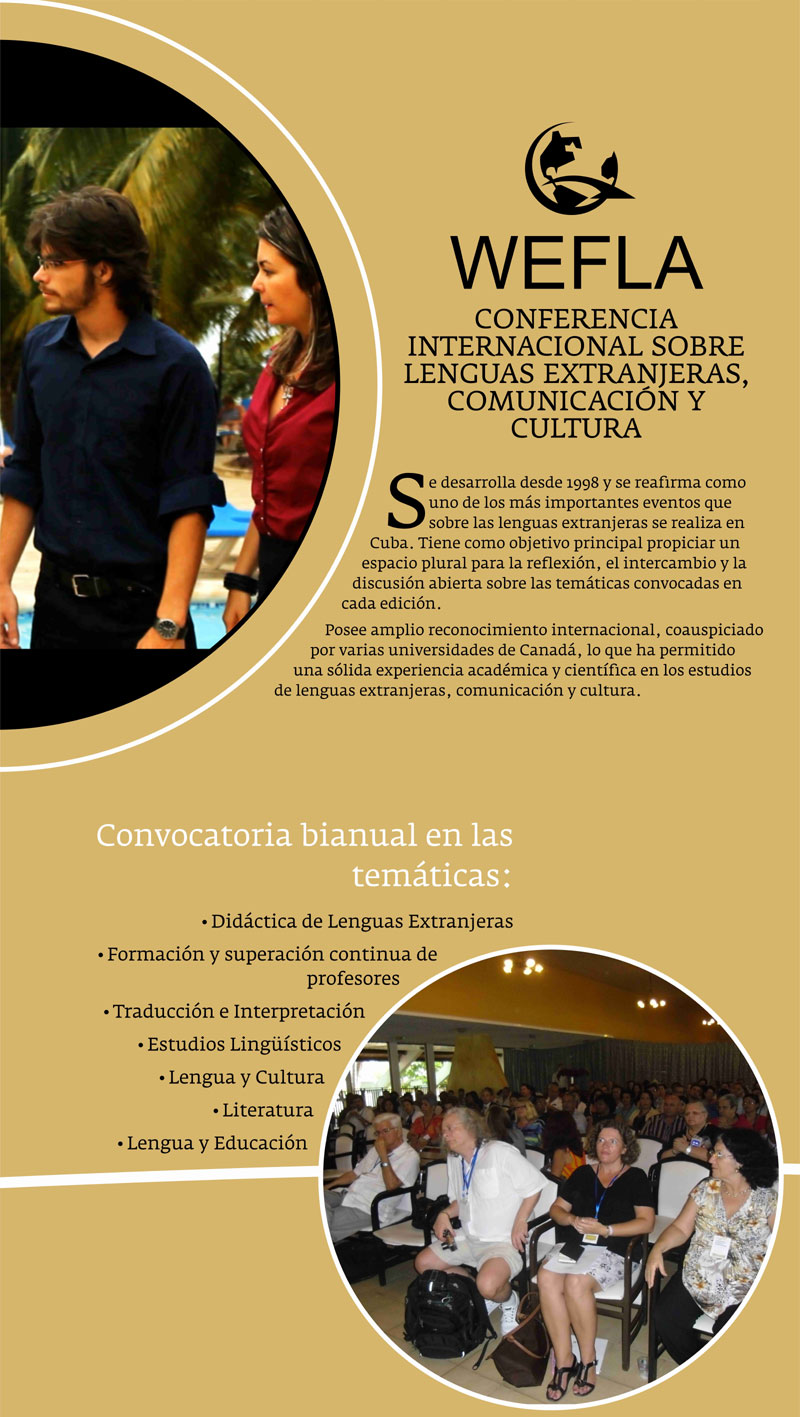
[su_youtube url=”http://youtube.com/watch?v=e4tU70U5FL8″]
